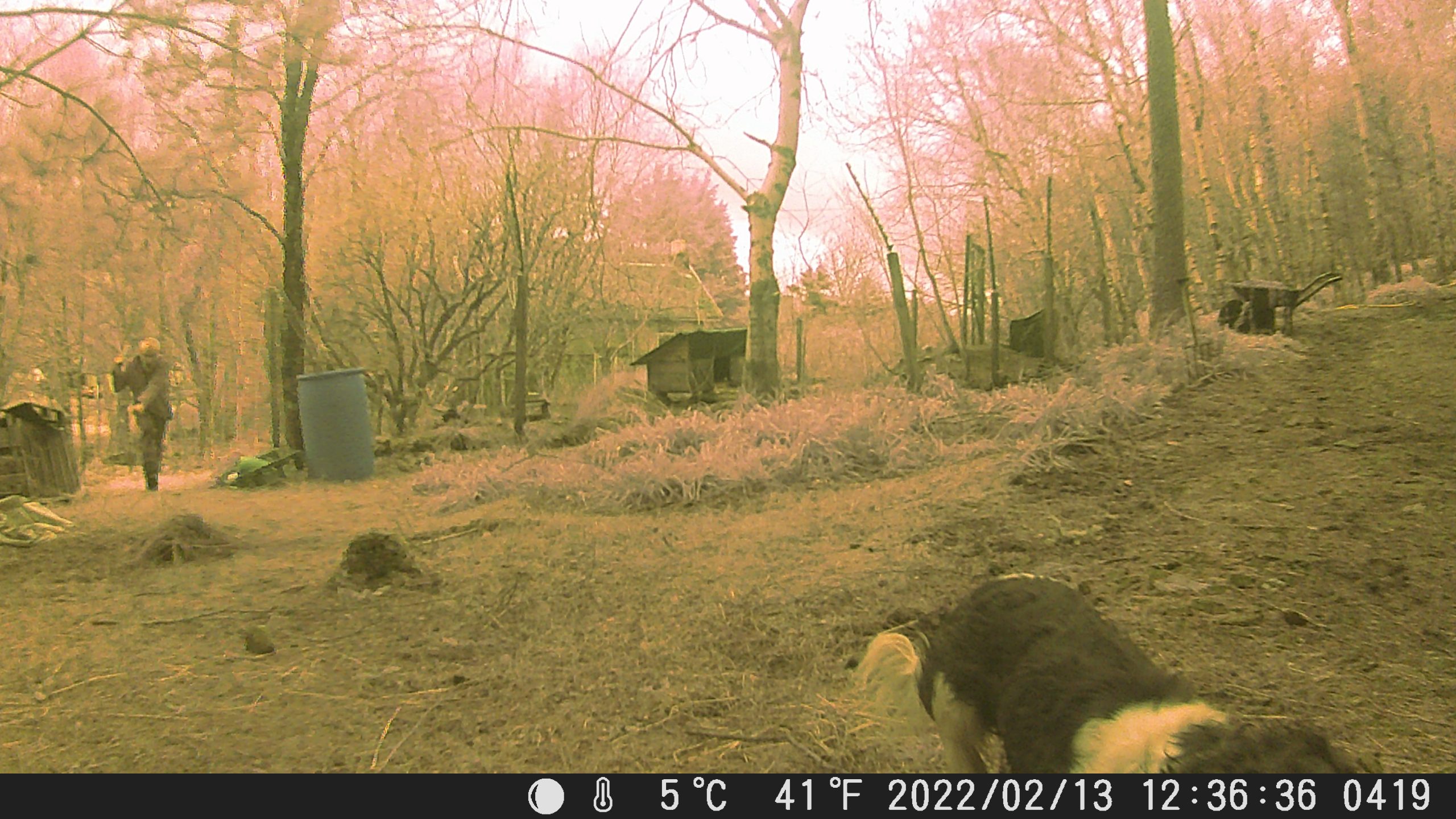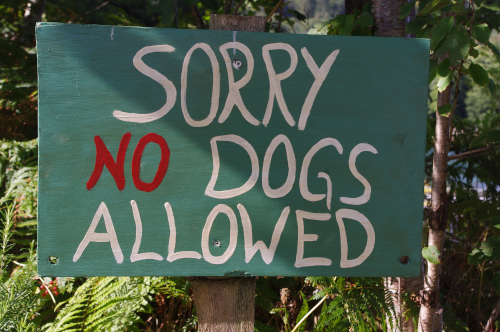WHY NO DOGS on RUBHA PHOIL?
If you can’t access the land without the help of your dog, we would love to remind you that registered guidedogs are welcome.
We understand that the relationship with your pet is a really important one. We love dogs. We wish we could have one or two ourselves. Please allow us to explain to you why we took this decision.
We understand that change is difficult to keep track off. Up until the end of 2016, dogs were allowed on this land. Rubha Phoil is a beautiful forested rock but it was unmanaged. Invasive species were left unchecked, deer were causing deforestation and mink was killing at will. 6 male Muscovy ducks and one female were destroying all pond life, responsible and irresponsible people, dogs and domesticated wild cats roaming everywhere, techno raves were frequent and crumbling structures and land fill sites dotted around the place. The police was a regular visitor. Social workers knew where to find their clients when they were missing appointments. That was then.
New management has arrived. Rubha Phoil is thriving.
A lot has changed on Rubha Phoil since ownership changed in 2016. We have a dedicated team of people with lots of experience in regenerative culture working hard, dedicating their entire or part of their lives to creating a example of life in harmony with nature. We have an active culture of sharing observations and teaching each other about our ecosystem using the 8-shields and nature awareness skills we are delving deep into. We use exercises called fox walk, owl eyes and deer ears to sharpen our senses. We raise our awareness of what is going on in our ecosystem and we are getting really good at that.
We are aware that a life in harmony with nature also means saying: Sorry, but NO, to activities that are disrupting that harmony. If those changes are needed they are implemented after a design exercise according to permaculture ethics and principles. First we do our homework and observe our interactions and adapt to any resistance there may be. This is not the first time we encountered resistance against the many changes. Rubha Phoil really was a popular dog running spot and the move to ban is not a very popular one amongst the dog owners. It wasn’t just a small (but sizeable) proportion of the tens of thousands of dogs that pass through the ferry port. People came from all over Skye to walk their dogs in our gardens. Rubha Phoil was on the regular visit list of a lot of dog owners. Especially as it is a forested ‘Island’ which is perfect for a dog at risk to disappear into the distance following the scent of a deer to go off the lead. Where ever you go on Rubha Phoil, the sea is not far away.
We lost a big potential economic yield by banning dogs. As real permaculturists, our vision of yield is bigger than the pursuit of money. Money is not our goal, it is only one element to fulfil an important function: creating abundance.
Back to the business of dogs on Rubha Phoil:
This the list of VALUES AND OBSERVATIONS AND FACTS we established during the first year, which lead to the final conclusion that having dogs on Rubha Phoil would not be in harmony with nature and not aligned with the values and goals of the project:
- We all love dogs.
- We couldn’t keep track of the number of dogs that visited us. There were simply too many to count. It was dozens and dozens every day during the busy season.
- When Ludwig made the deal to take over Rubha Phoil from the previous owner, he invited a 3th party to the table: The land and the life on it. He made the promise to look after them as best he could. That promise is sacred to him.
- There were numerous reports of chickens and ducks being scared. Loud bursts of angry and scary barking were a daily occurrence.
- The incessant yapping of certain breeds can be quite a disturbance when we’re trying to answer the questions while doing some weeding.
- Lots of visitors and tourists asked for a place to wash the dog poo from their shoes.
- Tracking is part of our observation routines so we could see tracks and dog faeces everywhere. In fresh and old and wrapped in plastic form. Some with human footprints on top of them and smears of dogs shit on the grass where people tried to clean their shoes.
- Lots of sticks with teeth marks were found everywhere.
- Digging in seemingly random places and also enlargement of underground tunnels of otters, voles, and other under ground living creatures.
- There were no ground nesting birds to be seen.
- We had a huge loss of yield in salads and herbs. No one dared to eat unprotected food from our gardens and our ecosystem.
- The smell of dog pee was pungent on top of otter sprains and other mammalian territorial markers.
- The aims of the community is to create a nature based culture, which involves reconnecting with nature. Playing games like hide and seek, crawling through mud, fox walk on bare feet, munching wild food, having a place where kids can have their outdoor schooling on the land is essential to achieve that goal.
- Kids (and their parents) like being able to play barefeet in the forest without stepping in dog poo. Similar feelings are expressed about the danger of dog bites.
- We all want to feel safe in our own garden and we all want everyone else to feel safe too.
- Finding plastic bags of rotting dog poo hanging in our trees is very disheartening and results in a feeling of being disrespected and being grumpy.
- No-one likes scraping dog poo from the soles of their shoes.
- Our customers deserve a dog poo free experience.
- Dogs don’t know the difference between vegetables or herbs and grass. We don’t like dog poo or pee on our salads.
- We do not want a gated community where every veg bed has a fence or where fences are needed to keep dogs out of certain area’s. These fences would also cost a lot of money and effort and maintenance.
- Some wildlife that live on Rubha Phoil like the otters are legally protected. Interfering with them is illegal.
- The otters would feel anxious and would move away if there is too much interference. Even regular dog-scent can turn them away.
- If a dog would attack or be attacked by an otter, the dog would likely loose.
- Rubha Phoil is incredibly rich in wildlife. We want to encourage that.
- The life stock is scared of dogs even of those with a muzzle. We are scared of loosing our life stock.
- Too many people, waiting for the ferry, seem to think that our garden is a quick perfect dog run and toilet stop.
- Quite a few customers express their appreciation of not having any dogs on the land. Some say that they booked with us for that reason. (observation from after the ban)
- There is no pressing need for Rubha Phoil to be a dog walking spot. There are lots of other alternatives. There are lots of gorgeous nearby places where dogs are welcome to ‘do their business’. This is the Isle of Skye after all. There is a nearby sandy beach across the road from us that is perfect for dogs. There is also a longer walk along a path made by the local community trust. All other options are much better for a run. Since we are closed to dogs, there are almost always several dogs running around on the beach. Plenty of mates to play with too.
- Dogs can bring in soil and forest diseases on the mud on their paws.
- Dog faeces can carry Toxocariasis. Toxocariasis can cause serious illness, and can even lead to blindness. It is caused by a parasite, known as Toxocara Canis, also commonly referred to as Roundworm.
After all these lessons observations, it was very clear that the dogs issue needed to be managed better.
We tried several ways to achieve a better result.
- We removed the adverts inviting dog walkers to Rubha Phoil.
- We asked people to keep their dogs on the lead. A big sign saying “Dogs on a lead only” only had partial success.
- We tried to keep dogs out of parts of our land, unsuccessfully.
- We tried to allow dogs access via the beach only. Numbers were reduced, but the problem wasn’t solved. People were frequently caught out by the rising tide and the time to walk back along the beach didn’t work for them, as the ferry was leaving soon.
- Polite reminders that people we accessing a garden and needed to clean up didn’t yield a noticeable result.
- We were still finding dog poo right in front of an otter holt and
- There was still the smell of dog pee on our salads and,
- Our ducks were still being chased … (see picture below)
- When I found myself being scared for my life when I attacked by 3 off the lead and uncontrollable Rottweilers, (when I was carrying a solar panel across my land and even though there was a sign that only dogs on the lead were allowed). It was clear that something needed to change.

Luckily I was nearby to stop this dog from killing our ducks
Enforcing ‘No dogs’ was the only option left.
It is not the dogs fault. It is the minority irresponsible owners that ruin it for everyone. We failed to find other solutions that are feasible and workable for us. If you have any suggestions, please don’t hesitate to tell us.
HOMEWORK:
Of course as a experienced trackers, permaculture designers, project managers, all round pretty intelligent people, we did our homework. After all, as passionate defenders and users of the right to roam and of knowing how passionate that topic is, we have taken legal advice before enforcing a ban. The right to roam is enshrined in Scots law and stopping people to exercise that right is an offence. We asked one of the most prominent land right campaigners to recommend me a solicitor. He kindly did. This solicitor told us that it would NOT be difficult at all to argue the right to restrict access of dogs to the whole of Rubha Phoil, including all the land, up to the high tide mark. For quite a few reasons as provided by law, while one reason would be enough. You are walking through our gardens, our food growing land, our school and at all times you are close to or in otter territory.
Please remember, you are not prohibited from roaming the land at the back of Rubha Phoil. You are only prohibited from entering with a dog that is not registered as a guide dog.
Rubha Phoil management team
